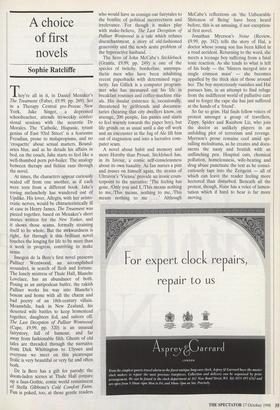A choice of first novels
Sophie Ratcliffe
They're all in it, in Daniel Menaker's The Treatment (Faber, £9.99, pp. 269). Set in a Therapy Central pre-Prozac New York, Jake Singer, a depressed schoolteacher, attends tri-weekly confess sional sessions with the neurotic Dr Morales. The 'Catholic, Hispanic, tyrant genius of East 93rd Street' is a fearsome Freudian, prone to malapropisms, and no `croquette' about sexual matters. Bound- aries blur, and as he details his affairs in bed, on the couch, Jake starts to feel like a well-thumbed porn pot-boiler. The analogy between therapy and fiction runs through the novel.
At times, the characters appear curiously sealed off from one another, as if each were torn from a different book. Jake's roving melancholy has wandered out of Updike. His lover, Allegra, with her aristo- cratic nerves, would be characteristically ill at ease in Henry James. The Treatment was pieced together, based on Menaker's short stories written for the New Yorker, and it shows those seams, formally straining itself to be whole. But the awkwardness is right,. for through it this brilliant novel touches the longing for life to be more than a work in progress, contriving to make sense.
Imogen de la Bere's first novel presents Palliser Wentwood, an accomplished scoundrel, in search of flesh and fortune. The lonely mistress of Thule Hall, Blanche Lovelace, has an abundance of both. Posing as an antipodean butler, the rakish Palliser works his way into Blanche's bosom and home with all the charm and bad poetry of an 18th-century villain. Meanwhile, back in New Zealand, his deserted wife battles to keep homestead together, daughters fed, and suitors off. The Last Deception of Palliser Wentwood (Cape, £9.99, pp. 320) is an unusual fairystory, full of humour, and far away from fashionable filth. Ghosts of old tales are threaded through the narrative from Dick Whittington to Ulysses and everyone we meet on this picaresque frolic is very beautiful or very fat and often both.
De la Bere has a gift for parody; the doom-laden scenes at Thule Hall conjure up a faux-Gothic, comic world reminiscent of Stella Gibbons's Cold Comfort Farm. Fun is poked, too, at those gentle readers who would have us consign our fairytales to the bonfire of political incorrectness and irrelevance. For though it makes play with make-believe, The Last Deception of Palliser Wentwood is a tale which refuses disenchantment, a story of old-fashioned generosity and the newly acute problem of the hyperactive husband.
The hero of John McCabe's Stickleback (Granta, £9.99, pp. 249) is one of the species of twitchy, borderline, unsympa- thetic men who have been inhabiting recent paperbacks with determined regu- larity. Ian Gillick is a computer program- mer who has measured out his life in breakfast routines and coffee-machine ritu- als. His insular existence is, occasionally, threatened by girlfriends and documen- taries (hearing that city dwellers know, on average, 200 people, Ian panics and starts to feel warmly towards the paper boy), but life grinds on as usual until a day off work and an encounter in the Jug of Ale lift him out of stagnation and into a lucrative com- puter scam.
A novel about habit and memory and more Hornby than Proust, Stickleback has, in its favour, a comic self-consciousness about its own banality. As Ian nurses a pint and muses on himself again, the strains of Ultravox's 'Vienna' provide an ironic coun- terpoint to the narrative: 'The feeling has gone, /Only you and I, /This means nothing to me, This means, nothing to me, This means nothing to me . . . ' Although McCabe's reflections on 'the Unbearable Shiteness of Being' have been heard before, this is an amusing, if not exception- al first novel.
Jonathan Myerson's Noise (Review, £9.99, pp. 342) tells the story of Hal, a doctor whose young son has been killed in a road accident. Returning to the ward, she meets a teenage boy suffering from a fatal toxic reaction. As she tends to what is left of his body — the 'blisters merged into a single crimson mass' — she becomes appalled by the thick skin of those around her. The boy mysteriously vanishes and Hal pursues him, in an attempt to find refuge from the indifferent world of palliative care and to forget the rape she has just suffered at the hands of a 'friend'.
So far so grim. Hal finds fellow voices of protest amongst a group of travellers, Zippy, Spider and Rainbow Liz, who join the doctor as unlikely players in an unfolding plot of terrorism and revenge. Myerson's prose remains cool amid spi- ralling melodrama, as he creates and docu- ments the nasty and brutish with an unflinching pen. Hospital cuts, chemical pollution, homelessness, wife-beating and drug abuse punctuate the text as he consci- entiously taps into the Zeitgeist — all of which can leave the reader feeling more hectored than disturbed. Beneath all the protest, though, Noise has a voice of lamen- tation which if hard to hear is far more moving.










































































 Previous page
Previous page